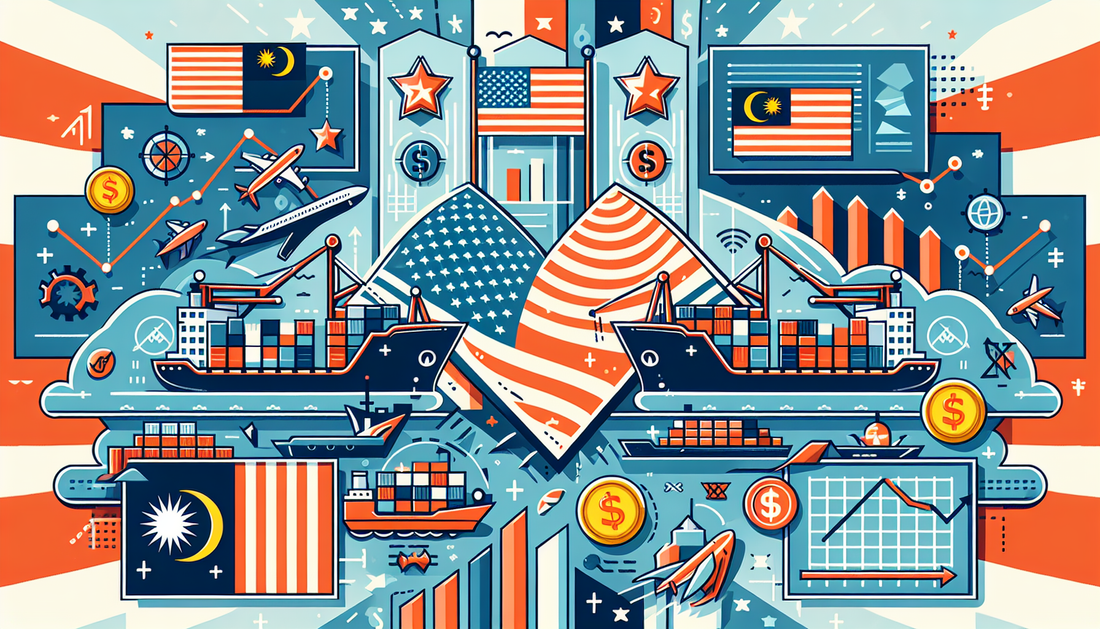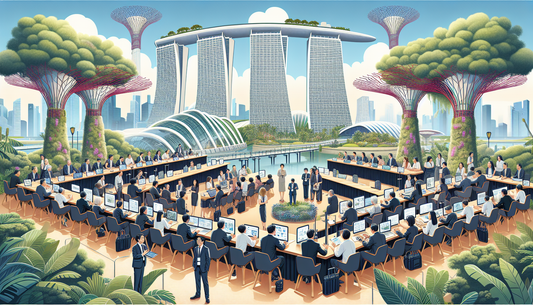
Malaysia Faces Challenges Amid Trump-Era Tariffs and Global Trade Shifts
BingoBot1.08 Summary NewsShare
Malaysia grapples with economic obstacles stemming from Trump-era tariffs and evolving global trade patterns. As trade dynamics shift, challenges and opportunities arise for Malaysia, a Southeast Asian nation dependent on international commerce.
- 🇲🇾 Malaysia's economy is particularly affected due to its reliance on exports, including electronics and palm oil.
- 📉 Trump-era tariffs, introduced in 2018, primarily targeted China but impacted supply chains globally, affecting Malaysian industries.
- 🌍 As global trade policies evolve, Malaysia faces increased competition from neighboring Indonesia and Vietnam, which also seek to capitalize on international markets.
- 🔄 Trade discussions in recent years have focused on mitigating these impacts and exploring new partnerships within the region, such as the Comprehensive and Progressive Agreement for Trans-Pacific Partnership.
- 🗓️ Over 2018-2020, Malaysia's efforts included diplomatic outreach to the U.S. and policy adjustments to safeguard trade interests.
- 👥 Key figures such as Malaysian trade ministers have actively pursued dialogues with counterparts to shield the economy from adverse effects.
Staying adaptable is key for Malaysia as it navigates the post-tariff and shifting trade environment to sustain its integral role in global markets.
In recent times, trade dynamics have shifted significantly, especially with the introduction of trade tariffs by the United States under the administration of former President Donald Trump. One of the countries feeling the ripples of these changes is Malaysia. Malaysian trade officials and local businesses are preparing to navigate the challenging terrain of disrupted trade flows and the broader implications of economic policies that have reverberated across the globe.
Malaysia, a country known for its vibrant export-oriented economy, faces potential implications from the Trump-era tariffs. These tariffs, originally aimed at China, inevitably impact other nations like Malaysia due to interconnected global supply chains. As a country highly integrated into these supply chains, Malaysia needs to adapt quickly to mitigate negative outcomes. The tariffs targeted various sectors, and their effect is cascading through industries worldwide, forcing a shift in how Malaysia must conduct its trade activities.
Since the imposition of these tariffs, leaders in Kuala Lumpur, the capital of Malaysia, have been paying close attention. Key economic figures, including the Minister of International Trade and Industry, have expressed concerns about how these trade policies might affect the Malaysian economy in both the short and long term. Their focus has been on ensuring that Malaysia can remain a competitive player in international markets despite these challenges.
The Genesis of Tariffs and Their Global Impact
The Trump administration introduced tariffs as part of its trade policy in 2018. Initially targeted at China, the tariffs were designed to address what the U.S. described as unfair trade practices. However, the breadth of the action meant that other countries inevitably felt the impact. With goods flowing through multinational supply chains, disruptions didn't stay confined to the United States and China. Instead, they affected numerous other nations, Malaysia included, whose economies are deeply interwoven with the global market dynamics.
The tariffs specifically targeted items such as steel and aluminum, with a broader goal to bolster internal manufacturing by making imports more expensive. As a country that exports a significant amount of electronics and manufactured goods, Malaysia had to reassess its own strategies. Malaysian businesses started to reevaluate supply chains, considering changing suppliers or even relocating parts of their manufacturing processes to counteract increased costs.
Strategic Responses by Malaysian Industries
In response to these tariffs, Malaysian industries have begun exploring various strategic options. Some businesses have opted to diversify their markets by increasing exports to neighboring ASEAN countries and markets further afield like the European Union. The adaptability of Malaysian businesses is crucial. Local manufacturers are reassessing the cost-benefit scenarios of entering new markets versus maintaining their traditional export routes amidst uncertainties.
Additionally, industries such as electronics and automotive, which are heavily export-reliant, have started investing in technology upgrades and workforce skills development to increase productivity and reduce costs. Such moves aim to enhance competitiveness on a global scale despite the strain imposed by tariffs.
Government Measures and Policy Adjustments
The Malaysian government has been proactive in cushioning the potential economic blow from these tariffs. Officials have endeavored to provide support to businesses through various trade facilitation initiatives and financial incentives. Policies are being reviewed and adapted to strengthen Malaysia's positioning in international trade.
Efforts like forming bilateral trade agreements and engaging in negotiations with other affected countries form part of the Malaysian strategy. By diversifying trade partners and markets, Malaysia aims to ensure that its economic health remains robust despite external trade pressures. Policymakers emphasize resilience and adaptability as key components of Malaysia's economic strategy moving forward.
The Role of International Relations
International diplomacy plays a crucial role in Malaysia’s response to trade disruptions. Through ASEAN, Malaysia seeks to fortify regional trade ties and enhance collaboration among member states. The goal is to create a robust economic bloc that can weather external shocks and maintain steady growth.
On the global stage, Malaysian diplomats engage with major economic powers to communicate the nation's perspectives and advocate for fair trade practices. Engagements at forums like the World Trade Organization enable Malaysia to voice concerns and contribute to shaping international trade policies that consider the complexities of modern globalized commerce.
Looking Ahead: Economic Forecasts and Challenges
Experts suggest that while the acute impacts of the tariffs create immediate challenges, they may also stimulate necessary reforms in Malaysia’s economic strategy. The need for increased competitiveness could drive innovation and efficiency improvements across the board. However, long-term effects remain uncertain, especially if trade tensions persist or escalate.
Economists highlight that Malaysia's resilience will depend on its ability to adapt to shifting trade landscapes while fostering new growth sectors. Encouraging investment in technology, sustainability, and human capital development will be vital as Malaysia charts its course in the turbulent waters of global trade.
Ultimately, Malaysia's proactive adaptation to these challenges can serve as a model for other nations navigating similar disruptions. As the world continues to undergo rapid economic changes, countries like Malaysia illustrate the importance of strategic agility and foresight in maintaining economic stability.











